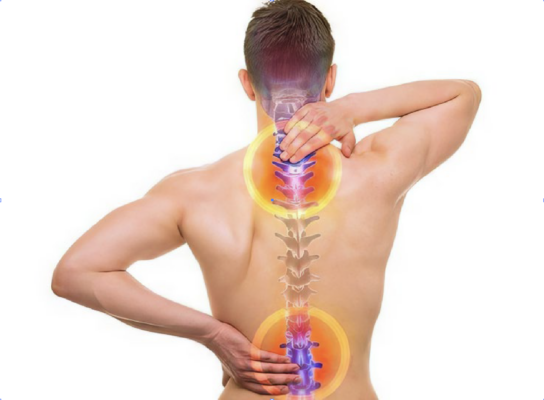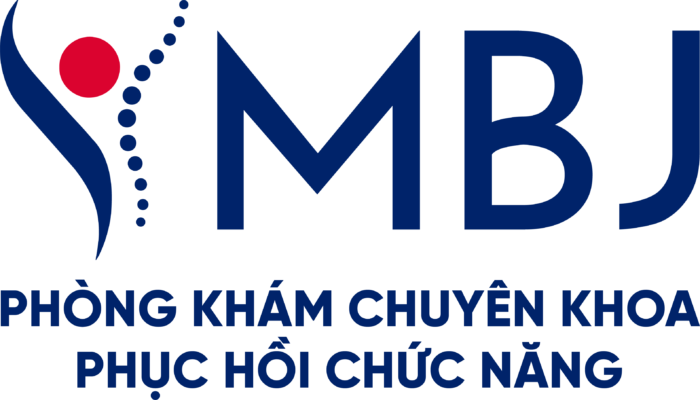If not treated promptly, a herniated disc can lead to many dangerous complications such as muscle atrophy, loss of sensation in the hands and feet, and even permanent paralysis. Some methods often chosen by patients, such as taking medication, pain relief injections, acupuncture, or acupressure, only provide temporary pain relief. They do not address the root cause of the condition and may also bring about many side effects.
Nội dung
- 1 What is a Herniated Disc?
- 2 Signs and Symptoms of a Herniated Disc
- 3 Main Causes of a Herniated Disc
- 4 Is a Herniated Disc Dangerous? Complications to Be Aware Of
- 5 Effective Treatment Methods for Herniated Discs Today
- 6 Definitive, Non-Surgical Treatment for Herniated Discs at MBJ Clinic
- 7 Frequently Asked Questions (FAQ)
What is a Herniated Disc?
A simple definition of a Herniated Disc
A herniated disc is a condition in which the nucleus pulposus (the soft inner part of the disc) protrudes from its original position, compressing a nerve root or the spinal cord. This causes pain, numbness, loss of sensation in the limbs, and limited movement for the patient.

Common Locations for a Herniated Disc
- Cervical Spine Herniated Disc: The cervical spine is divided into 7 vertebrae, labeled C1 to C7, which connect the head to the main spine of the body.
- Lumbar Spine Herniated Disc (L4-L5, L5-S1): The most common locations for herniation in the lower back are the L4-L5 and L5-S1 discs. These two discs are responsible for supporting the entire upper body, and the significant pressure on them makes the nucleus pulposus more likely to protrude.
Signs and Symptoms of a Herniated Disc
Signs of a Cervical Spine Herniated Disc
- Pain along the nape of the neck: Patients often experience sharp pain, numbness, and aching in the neck area that radiates down to the nape and shoulders, especially after holding the neck straight, bending forward for a long time, or after waking up.
- Some patients also experience pain radiating to the head, dizziness, and nausea, accompanied by a burning sensation in the neck area.
- Muscle weakness: As the condition worsens, the muscles in the arms and shoulders tend to atrophy due to limited mobility. Occasionally, a person may be unable to hold even a small object.
- Loss of sensation: If a cervical herniated disc is not treated in time, the patient may experience intense numbness and tingling even without movement.
- Limited range of motion: Difficulty in bending the neck forward/backward or rotating it can occur in many patients. Additionally, patients may experience symptoms like tinnitus (ringing in the ears), decreased vision, ear pain, or difficulty swallowing if the condition progresses.
Signs of a Lumbar Spine Herniated Disc
- Low back pain: A dull or persistent ache in the lumbar region that intensifies with bending, standing, sitting for long periods, or lifting heavy objects.
- Numbness and tingling: Many patients experience numbness and tingling that radiates from the lower back down through the buttocks to the legs, and sometimes even to the toes.
- Radiating pain and muscle atrophy: A lumbar herniated disc not only affects the lower back but also causes pain in the buttocks and legs. This limits mobility and daily activities, causing muscle mass to gradually atrophy over time from lack of use.
- Loss of bodily control: The ability to control urination and defecation may gradually be lost, and the area from the buttocks to the legs can be severely affected.
Other Systemic Symptoms
Inability to move the limbs, severe pain, and disorders of temperature and touch sensation.
Main Causes of a Herniated Disc
Some of the main causes of a herniated disc include:
- Aging: The natural process of degeneration causes the discs to lose water, reducing their natural elasticity and making them more susceptible to injury.
- Incorrect posture in daily life and work: Sitting in the wrong posture for long periods, lifting heavy objects, or having a job that puts significant pressure on the discs can cause a herniated disc.
- Spinal injuries: Sudden, forceful movements or direct trauma to the discs and vertebrae.
- Other factors: Genetics, being overweight, or obesity, which increases pressure on the spine.
Is a Herniated Disc Dangerous? Complications to Be Aware Of
A herniated disc is not life-threatening, but if not treated properly and promptly, patients can face many serious complications:
- Bowel and bladder dysfunction: Prolonged compression of the nerves in the lumbar region by the nucleus pulposus can lead to problems such as urinary retention, urinary incontinence, or even a complete loss of bowel and bladder control.
- Cauda Equina Syndrome: This is a serious neurological emergency. A herniated disc in the lumbar spine can cause Cauda Equina Syndrome when the nerve roots at the lower end of the spinal cord are compressed, leading to symptoms like severe back pain, loss of sensation in the legs, bladder and bowel dysfunction, and can even result in paralysis.
- Sciatica: The nucleus pulposus can compress the sciatic nerve root—the largest nerve in the body—causing pain that radiates from the back down through the buttock, thigh, calf, and foot.
- Cerebral ischemia leading to stroke: Patients with a cervical herniated disc may face frequent dizziness and headaches due to the nucleus pulposus compressing nerves in the neck, obstructing blood vessels, and potentially leading to complications like a stroke, which can be fatal at any time.
- Cervical spinal stenosis: When the nucleus pulposus compresses nerves, the cervical spinal canal is also significantly compressed, reducing the diameter of the spinal canal depending on the severity of the herniation.
- Permanent paralysis: The most severe complication of a herniated disc is permanent paralysis of the limbs, resulting from a lack of early detection and proper treatment during the “golden” period.
Effective Treatment Methods for Herniated Discs Today
Non-Surgical Methods
In the early stages of a herniated disc, patients can effectively manage pain with at-home methods:
- Rest and lifestyle changes: Limit strenuous and heavy activities to reduce pressure on the spine. Adopt healthier habits such as regular exercise and a diet rich in green vegetables and nutrients.
- Physical therapy: Undergoing physical therapy with a specialist helps improve bone and joint nutrition, increase muscle strength, and effectively relieve muscle spasms.
Medical Management
- Using pain relievers as prescribed by a doctor, performing muscle relaxation exercises, and taking supplements for cartilage and discs under the guidance of a musculoskeletal specialist.
Surgical Treatment
- Disc surgery is usually recommended for patients with very severe herniated discs and clear neurological complications.
Definitive, Non-Surgical Treatment for Herniated Discs at MBJ Clinic
MBJ Clinic is proud to be the first and only unit in Thu Dau Mot Ward, Ho Chi Minh City, to eliminate the pain of herniated discs for tens of thousands of patients without using medication, injections, or surgery.
Why choose physical therapy at MBJ?
MBJ possesses 5 exclusive “golden” advantages that help eliminate all pain without leaving any sequelae, ensuring absolute safety for all patients, including the elderly.
- 100% Specialist Doctors: Our team consists entirely of musculoskeletal specialists with over 10 years of experience.
- Personalized Treatment Plans: A 1-on-1 treatment plan is personalized for each patient, adhering to 3 principles: No Medication, No Injections, No Surgery.
- High-Tech Equipment: We use a system of high-tech equipment imported from the USA, meeting US FDA standards.
- Proven Success: Tens of thousands of patients have successfully recovered up to 90% of their mobility after just one American-standard treatment protocol at MBJ.
The Examination and Treatment Process for Herniated Discs at MBJ Clinic
- Step 1: Clinical Examination A specialist doctor directly examines each point of pain on the body and reviews imaging results (like MRI or X-ray) to accurately diagnose the patient’s spinal health condition.
- Step 2: Develop a Personalized Plan A treatment plan is personalized based on the initial diagnosis, adhering to three criteria: no medication, no injections, no surgery, addressing the condition from its root cause.
- Step 3: High-Tech Treatment We exclusively use a system of high-tech machines that meet US FDA standards throughout the treatment process. We heal the condition at its source by stimulating the body’s natural healing mechanisms, providing safe and up to 90% effective results.
- Step 4: Functional Rehabilitation Exercises After each treatment session, patients are guided on how to care for and maintain their joint and bone health at home to optimally support the effectiveness of the treatment process.
Frequently Asked Questions (FAQ)
Can a herniated disc be completely cured? A herniated disc cannot be completely cured. However, it can be significantly controlled and improved with conservative treatment methods.
How long does treatment for a herniated disc take? The time to achieve complete pain relief varies among patients, depending on the severity of the herniation and how early the condition was detected. Therefore, patients should visit a reputable clinic to be examined by a specialist and receive a specific treatment plan.
Can you have sexual intercourse with a herniated disc? A person with a mild herniated disc can still have sexual intercourse but should be mindful of the intensity and positions to avoid injuring the spine. Sexual activity should be avoided if the condition is severe.
What is the cost of physical therapy for a herniated disc? Methods like medication, pain relief injections, or acupressure typically have a low cost, ranging from a few tens of thousands to a few hundred thousand VND per session. Disc surgery can range from 100 – 200 million VND. In contrast, the conservative treatment method at MBJ Clinic—without medication, injections, or surgery—is often up to 80% more cost-effective while still ensuring optimal and definitive treatment.
Can a herniated disc heal on its own? A herniated disc cannot heal on its own. The condition can worsen if not treated properly.
A herniated disc is a common condition that can affect anyone, including young people, so it should not be taken lightly. Early recognition of symptoms and proper treatment will help patients prevent complications and significantly increase their chances of recovery. As soon as you notice unusual neck pain, back pain, or numbness in your hands and feet – do not hesitate. Visit MBJ Clinic for timely examination and treatment with modern, safe methods – without medication or surgery.

 Tiếng Việt
Tiếng Việt

